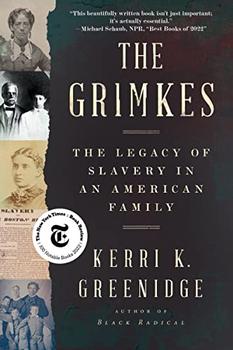Summary | Excerpt | Reviews | Beyond the Book | Readalikes | Genres & Themes | Author Bio

The Legacy of Slavery in an American Family
by Kerri K. Greenidge
Archie scoffed at the whispered critiques of his daughter. He reminded Nana that "the colored people of high position are often wont to eat their own." Eventually, all of the chatter would subside, Archie concluded, since "the Grimke name is as strong as oak. It will carry you through as it has carried all of us." 12 Yet the fact that Nana was forced to answer for her supposed "boldness" and that her family's position atop the colored elite exposed her to constant ridicule and private mumblings about her racial fidelity, proved just how burdensome the Grimke name could be for the Black people who bore its legacy.
Nearly one thousand miles to the west, on the plains of southern Illinois, the Grimke name did not place a similar burden on Dr. Angelina Grimke Hamilton, the only surviving granddaughter of nineteenth-century abolitionist and women's rights orator Angelina Grimke. Eight years older than her Black third cousin, with whom she never associated, Angelina Hamilton was also known by her childhood nickname, "Nana." Unlike the Black Nana, however, Nana Hamilton was brought up to exalt her Grimke family history as proof of her ancestors' "unimpeachable service to the oppressed" while ignoring their slaveholding legacy. That story had been inculcated in her by her mother, Sarah Weld Hamilton, who was the only daughter of Angelina Grimke and Theodore Dwight Weld; niece to the women's rights and antislavery writer Sarah Grimke; and wife to an unremarkable if morally earnest Congregational minister, Reverend William Hamilton.
Sarah Weld Hamilton, called Sissie by her family, raised her Nana in the sleepy, mostly white towns of Michigan, Kansas, and wherever else in the midwestern countryside that Reverend Hamilton was called to serve. Sissie was proud of her family, so proud in fact that she spent much of her daughter's childhood writing a multitome biography of her father, a famous evangelical reformer and antislavery writer, despite Weld's insistence that he didn't need one and even though her sister-in-law grumbled that Sissie was unsuited for the task. By the time she died in 1901, Sissie managed to complete the biography, but she never published it. And so it fell to Nana Hamilton to preserve the family history, which she did, faithfully organizing the letters, papers, and personal diaries that confirmed the story Sissie told her: that Grandmother Angelina and Great Aunt Sarah Grimke had disavowed their slaveholding lives in Charleston, South Carolina, to selflessly fight for "the freedom of the slave"; that they were the "first American women" to ever speak about antislavery and women's rights; and that when they discovered that their slaveholding brother fathered three children with an enslaved woman, they selflessly provided for these children as if they were their own. 13
Because Nana Hamilton believed this story of her Grimke ancestors' racial benevolence, she was neither forced to confront the legacies of her relatives' slaveholding past nor called to reckon with how this past reverberated throughout the racial system in which she thrived. She never had to face the fact that she made a home and career for herself in one of the most notorious sundown towns in the country, hundreds of miles from the East Coast reform circles that had launched her grandparents' and great-aunt's activist careers.
The town was Anna, Illinois, a sleepy farming community located just north of the Kentucky border. In 1909, as Nana Hamilton began her medical career in state hospitals across the region, white townspeople there waged a bloody war against their Black neighbors. While Anna's white residents had long bristled at the presence of Black migrants in their town, that November their rage reached a boiling point as they attempted to lynch a Black man, William "Froggie" James, who was accused of murdering a white woman. James had fled by train from the nearby town of Cairo, where the alleged murder took place, and although the crowd in Anna didn't succeed at first in forcing James off the rail car and hanging him from a tree, they eventually helped white citizens from Cairo recapture the Black man as he hid in the woods near Dongola, Illinois. White residents of Anna were also there as the crowd in Cairo hung James from a tree, riddled his body with hundreds of bullets, then tore off his limbs, ears, and head in an orgy of unrestrained racial violence for which no one in the thousands-deep crowd was punished. 14
Reprinted from The Grimkes: The Legacy of Slavery in an American Family by Kerri K. Greenidge. Copyright © 2022 by Kerri K. Greenidge. Used with permission of the publisher, Liveright Publishing Corporation, a division of W. W. Norton & Company, Inc. All rights reserved.
Your guide toexceptional books
BookBrowse seeks out and recommends the best in contemporary fiction and nonfiction—books that not only engage and entertain but also deepen our understanding of ourselves and the world around us.